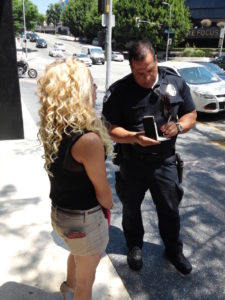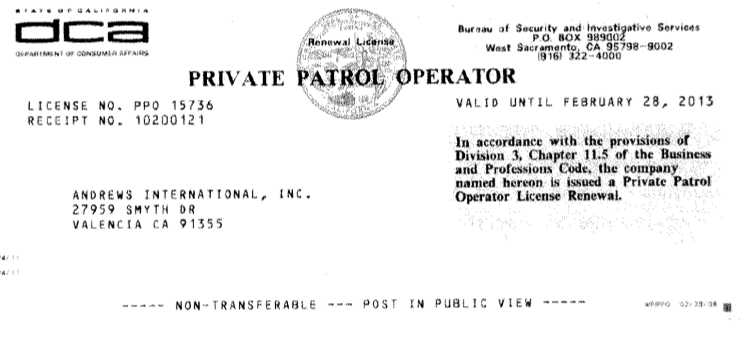
The City Attorney’s version retains essentially (only small changes) the pre-existing definition of a private patrol service:
The term “private patrol service” shall mean any person or association of persons, or partnership, or corporation which furnishes or purports to furnish to members, subscribers, or customers any uniformed or special street patrol officer for the purpose of affording additional security and protection of person and property or to perform any other service directly related to the “private protection of life and property”.
By the time the Police Commission approved it in April 2000, though, it said:
The term “private patrol service shall mean any person, association of persons, or partnership, or corporation “private patrol operator” as defined in the California Business and Professions code…
And this clause is in the law to this day. Well, The Business and Professions code defines “private patrol operator” at section 7582.1(a):
7582.1. (a) A private patrol operator, or operator of a private patrol service, within the meaning of this chapter is a person, other than an armored contract carrier, who, for any consideration whatsoever:
Agrees to furnish, or furnishes, a watchman, guard, patrolperson, or other person to protect persons or property or to prevent the theft, unlawful taking, loss, embezzlement, misappropriation, or concealment of any goods, wares, merchandise, money, bonds, stocks, notes, documents, papers, or property of any kind; or performs the service of a watchman, guard, patrolperson, or other person, for any of these purposes.
There seems to be no plausible way that this doesn’t include the BID Patrol, right? But laws being written as they’re written, this section is followed by a lengthy list of exclusions from the definition. It’s at section 7582.2. It’s too long to reproduce here, but the only section that might even remotely be read as excluding BID security is at subsection (d):
7582.2. This chapter does not apply to the following:
…
(d) A charitable philanthropic society or association duly incorporated under the laws of this state that is organized and maintained for the public good and not for private profit.
Before I give you my (completely uninformed) thoughts on this, let me just mention that this version of the law, submitted to Council by the Police Commission in April 2000, came up before the Public Safety Committee1 on May 22, 2000. I don’t (yet) have a record of what was said there, but I do have the speaker cards. You will note that, at that meeting, Randall Ely of the DCBID, Tracey Lovejoy of the CCEA, and Joe Gorman of the Fashion District spoke. The first two have switched to supporting the proposal, and Gorman doesn’t say if he supports or opposes.2 Anyway, if their problem hadn’t been solved by whatever changes had been made, it’s hard to feature them supporting the revised law.
So, if, hypothetically, that exclusion from the definition of a private patrol operator in the Business and Professions Code is what got BIDs unregulated, it seems unsupportable. First we have to wonder whether BIDs are “charitable philanthropic societ[ies] or association[s].” They’re certainly nonprofits, but if the legislature had meant to exclude all nonprofits, one surmises they could have said so. In particular, BIDs are mostly run by 501(c)(6) organizations, also known as business leagues, and which include chambers of commerce and professional football leagues. These certainly are nonprofits, but it takes a stretch of the imagination and a certain nonchalant disregard for the truth to be able to call any of, e.g., the LA Chamber of Commerce, the National Football League, or zillion dollar woman Carol Schatz‘s creepy little sodality the Downtown Center BID a “charitable philanthropic society” with a straight face.
And, continuing on hypothetically, even if that objection failed for some reason, it’s going to take another huge stretch of the imagination to conclude that Business Improvement Districts (or their managing associations) are “organized and maintained for the public good and not for private profit.” It’s true that they’re not organized for private profit, but they’re also not organized for public good. In fact, they rely on the fact that they provide what are known in the trade jargon as special benefits (as opposed to general benefits, which are to the public good) to avoid most laws regulating taxes in California, including the need for a supermajority to impose them. If the BIDs have to argue that they’re “organized and maintained for the public good” all their little heads are going to explode. It’s not consistent with any of the presuppositions and underpinning fictions of BID funding.
And finally, supposing, still hypothetically, that someone made those stretches of the imagination and the 501(c)(6) associations which administer BIDs actually are meant to fall under this exemption at section 7582.2(d). Well, it’s clear from the wording that it’s the associations themselves that are excluded from being considered private patrol operators. I don’t have evidence, but I imagine that this section is meant to apply to groups like the Guardian Angels rather than groups like the BIDs which are the customers of security companies. It’s not plausible that just because a (hypothetically) philanthropic society hires a contractor, that contractor becomes a philanthropic society. Otherwise, e.g., wouldn’t plumbers who fixed the toilets in a church become nonprofits?

Finally, and this is pretty definitive, I think, at least Andrews International, who runs our local Hollywood BID Patrol, has admitted that it’s not excluded from the above-discussed definition of a private patrol operator by applying for and receiving a private patrol operator license from the California State Bureau of Security and Investigative Services. I have a copy of the 2012 license, but it’s current even now. There’s a picture of it somewhere in the vicinity, and you can also see it here.
You might well argue, and this may in fact be what’s happening, that A/I has to have that license for all their other security operations. However, the way that LAMC 52.34 is worded it applies to companies which satisfy the definition in the Business and Professions Code. It doesn’t say it applies to companies which satisfy the definition unless they’re acting in a role which is excluded from the definition. It seems that there’s no proof of satisfying the definition more definitive than having (voluntarily) applied for and obtained a license required of firms that satisfy the definition.
Anyway, there’s (at least) one more major part to this story, and I’ll reveal it as soon as all the pieces are in place. I’m shooting for next week, but we’ll see. Stay tuned!
All images in this post are public records and therefore not subject to copyright.
- Which sounds like a bad nightmare from the French Revolution, but what’s to be done about it?
- I mentioned earlier that last week I went out to the Fashion District and read through their board minutes for 1999 and 2000. There was some discussion of this issue in 1999, although nothing that solves the problem. There was none in 2000, so it’s probably not possible at this date to figure out what Joe Gorman thought about it unless I can get my hands on a tape or transcript of the meeting.
